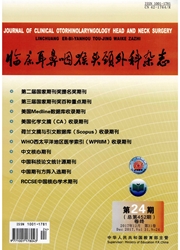

 中文摘要:
中文摘要:
目的:探讨突发性聋伴耳鸣患者的一般特征和耳鸣的特点。方法:采用耳鸣问诊表及耳鸣致残量表对272例突发性聋伴耳鸣患者进行问卷调查,分析耳鸣的类型、部位、耳鸣方式、对生活的影响、耳鸣加重影响因素等。结果:低频耳鸣占41.6%,中频耳鸣占2.0%,高频耳鸣占56.4%;持续性耳鸣占79%,间断性耳鸣占21%;从耳鸣对日常生活影响看,37.4%患者有轻微影响,44.8%有中度影响,17.8%有重度影响;加重耳鸣的影响因素有睡眠、噪音、压力和劳累等。从耳鸣致残量表看,轻度或轻微耳鸣占33.8%,中重度耳鸣42.2%;灾难性耳鸣23.5%。结论:突发性聋伴耳鸣患者对患者的影响较大,需加强个性化耳鸣评估,特别要关注患者的睡眠、情绪,进行针对性耳鸣咨询,优化患者休养环境,减少耳鸣对患者的影响。
 英文摘要:
英文摘要:
Objective:To investigate the characteristics of sudden sensorineural hearing loss(SSHL)patients with tinnitus.Method:Two-hundred and seventy two SSHL patients with tinnitus underwent evalution through Tinnitus Handicap Inventory(THI)and Tinnitus Questionnaire(TQ).Demographic data and tinnitus characteristics were analyzed.Result:In 272 patients,41.6% of patients suffered from low frequency tinnitus,2.0% with medium frequency tinnitus,56.4% with high frequency tinnitus.There were 79% patients whose tinnitus were continous,while 21% were intermittent;From the view point of daily life compromising,37.4% were minor,44.8% were moderate,17.8% were serious.The most important factors that deteriorate tinnitus were bad sleep,noise,life pressure and tiredness.Conclusion:There were individual differences among patients with sudden deafness and tinnitus.Enough evaluation should be made to decrease the infection of tinnitus.
 同期刊论文项目
同期刊论文项目
 同项目期刊论文
同项目期刊论文
 期刊信息
期刊信息
